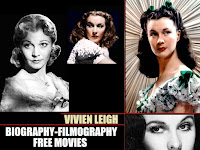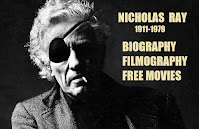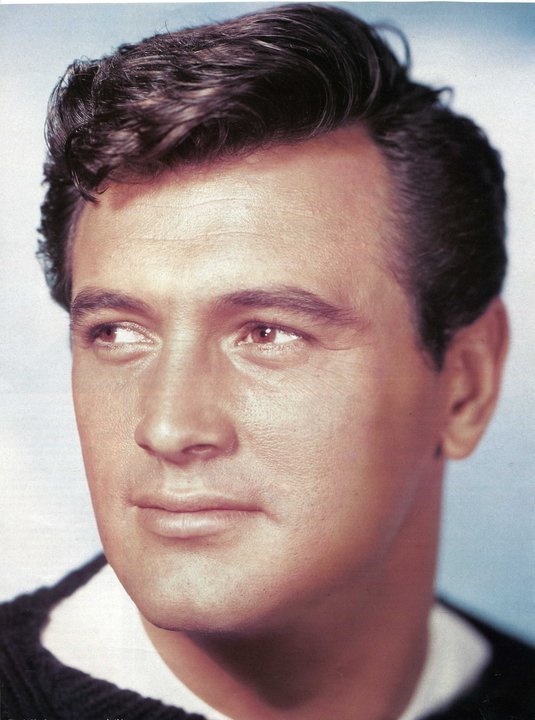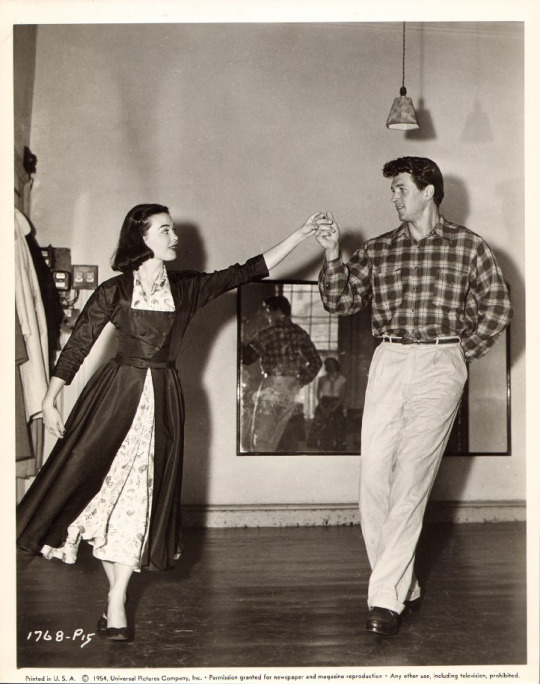From All Movie Guide: American actor Rock Hudson was born Roy Scherer, adopting the last name Fitzgerald when his mother remarried in the mid-'30s. A popular but academically unspectacular student at New Trier High School in Winnetka, IL, he decided at some point during his high school years to become an actor, although a wartime stint in the Navy put these plans on hold. Uninspiring postwar jobs as a moving man, postman, telephone company worker, and truck driver in his new home of California only fueled his desire to break into movies, which was accomplished after he had professional photos of himself taken and sent out to the various studios. A few dead-end interviews later, he took drama lessons; his teacher advised him to find a shorter name if he hoped to become a star, and, after rejecting Lance and Derek, he chose Rock ("Hudson" was inspired by the automobile of that name).
Signed by Universal-International, Hudson was immediately loaned to Warner Bros. for his first film, Fighter Squadron (1948); despite director Raoul Walsh's predictions of stardom for the young actor, Hudson did the usual contract player bits, supporting roles, and villain parts when he returned to Universal. A good part in Winchester '73 (1950) led to better assignments, and the studio chose to concentrate its publicity on Hudson's physical attributes rather than his acting ability, which may explain why the actor spent an inordinate amount of screen time with his shirt off. A favorite of teen-oriented fan magazines, Hudson ascended to stardom, his films gradually reaching the A-list category with such important releases as Magnificent Obsession (1954) and Battle Hymn (1957). Director George Stevens cast Hudson in one of his best roles, Bick Benedict, in the epic film Giant (1956), and critics finally decided that, since Hudson not only worked well with such dramatic league leaders as Elizabeth Taylor and James Dean -- but frequently outacted them in Giant -- he deserved better, less condescending reviews.
Hudson's career took a giant leap forward in 1959 when he was cast in Pillow Talk, the first of several profitable co-starring gigs with Doris Day. Once again taken for granted by the mid-'60s, Hudson turned in another first-rate performance as a middle-aged man given a newer, younger body in the mordant fantasy film Seconds (1966). A longtime television holdout, Hudson finally entered the weekly video race in 1971 with the popular detective series McMillan and Wife, co-starring Susan Saint James, and appeared on the prime time soap opera Dynasty in the early '80s. Regarded by his co-workers as a good sport, hard worker, and all-around nice guy, Hudson endured a troubled private life; though the studio flacks liked to emphasize his womanizing, Hudson was, in reality, a homosexual. This had been hinted at for years by the Hollywood underground, but it was only in the early '80s that Hudson confirmed the rumors by announcing that he had contracted the deadly AIDS virus. Staunchly defended by friends, fans, and co-workers, Rock Hudson lived out the remainder of his life with dignity, withstanding the ravages of his illness, the intrusions of the tabloid press, and the less than tasteful snickerings of the judgmental and misinformed. It was a testament to his courage -- and a tragedy in light of his better film work -- that Hudson will be principally remembered as the first star of his magnitude to go public with details of his battle with AIDS. He died in 1985.







.jpg)







.jpg)





.png)




.jpg)






.jpg)













.jpg)


























































































































.jpg)







.jpg)





.png)




.jpg)






.jpg)













.jpg)


.jpg)










.jpg)



.jpg)

.gif)

.jpg)



.jpg)

















.jpg)
.jpg)

.jpg)
.jpeg)